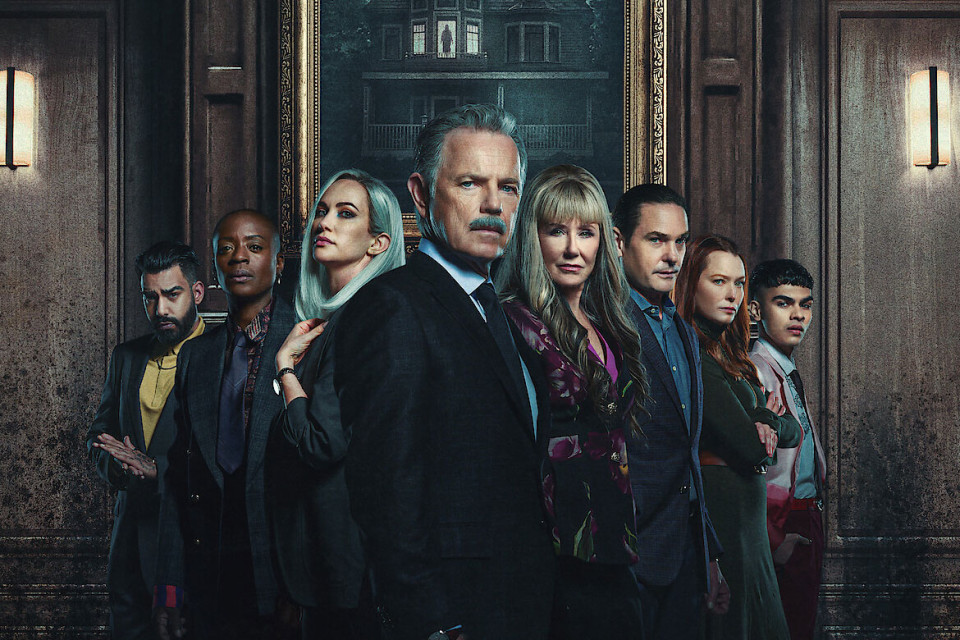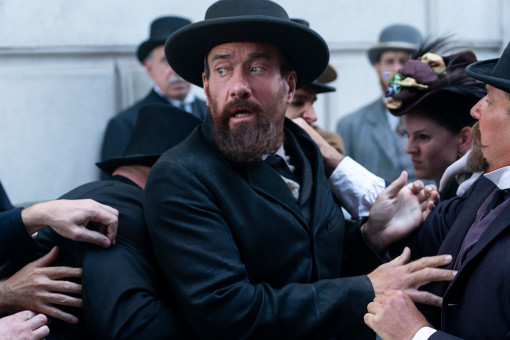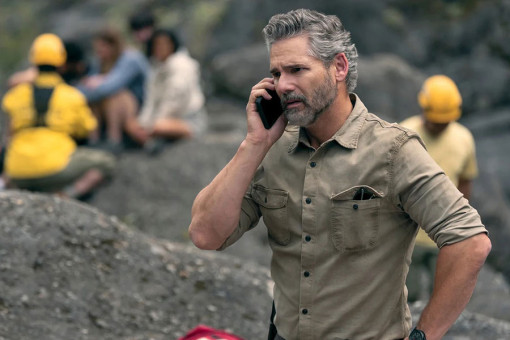Andy Grush and Taylor Stewart, collectively known as The Newton Brothers, have composed scores for some of the most esteemed projects in contemporary horror.
From Netflix's The Haunting of Hill House to Blumhouse's recent Five Nights at Freddy's, the Newtons have made memorable contributions across television and film. But a significant amount of that work has been with filmmaker Mike Flanagan; their collaboration began with Flanagan's 2013 feature film, Oculus, and has continued through each of the writer-director's projects ever since — including Flanagan's most recent (and last) horror series for Netflix, The Fall of the House of Usher, which is inspired by the works of Edgar Allan Poe. While The Newton Brothers never directly set out to become horror composers, they share an affinity for the genre and a keen ability to find new chords within it, which makes them essential voices who not only understand horror but can see beyond what's expected by audiences.
And speaking of expectations, The Newton Brothers will next be heard in Mike Flanagan's next film, The Life of Chuck, a drama based on a Stephen King short story. They also are scoring the highly anticipated Marvel and Disney+ animated series, X-Men '97. Until then, let us turn back to the forbidden rooms and secret walls of the House of Usher as the duo reveals how they helped bring the hit series' sonic (and scary) landscape to life.
Television Academy: One of the things I love about your compositions is how sweeping they feel. For example, the track "F**k Blippi" from House of Usher is one of my favorites because I feel like it captures the essence of what you guys aim for. I'm curious where that approach comes from.
Taylor Newton: Andy and I both typically like melody over noise. But, as you know, a lot of horror genre projects — especially upon talking to the director and the producers — don't want melody. They want noises and sounds, so you're limited in how much melody you can create. Mike tends to gravitate towards melody with most of his projects, except maybe Doctor Sleep, so we always get a little more to push in that direction — which is what we prefer. If you can't do anything melodic, then texturally it has to be wildly different from what's out there to give it an identity.
Andy Newton: To tack onto what Taylor said, we realized back in Oculus that — and this seems so basic, but it's often overlooked — the more you care about a character, the more horrific or traumatizing it is when that character is either killed or has something happen to them. Oculus was probably the first project where we purposefully thought, "Let's make everyone care about this family and this character so that when things start going sideways, you're affected by it." Like "F**k Blippi" in House of Usher, [the cue] takes you through an introduction of all the characters, and you know you're going [eventually] come to dislike most of them, if not all of them. But the idea is that you want to be drawn into their world. The idea was to not make the music abrasive but rather lure you into their world so that you go through the arc of who are these people, what are they like, are they really this bad — oh, yes they are — or a good guy.
Silence is such a key component in horror, too, and so it's interesting when the score sometimes fades out a little bit at the right moment. Is that something that you implement as you're watching footage and composing as you're watching, or are you already working on the score before you see any footage?
Taylor: It's different for every project. With Mike, we usually tackle pre-score ideas long before he's in post-production because it's the most helpful for us and him. It gets the ideas flowing quickly, where we want to go melodically or tonally. It also helps us avoid temp music, which helps with the edit and the cut.
Andy: It's helpful establishing themes early on because then you don't have to be tied to the recording of an early pre-score theme. But the idea is that if you know what the melody or the chord progression or the sound is for the theme, then as the edit comes together you can start to watch and play that melody along with it, which also plays into finding spots for silence, too, because we find that in discussion you can say, "Oh, this will be better silent," but it's super helpful to score a scene that you think should be silent, or if you're on the fence about it. It's a bummer because it takes a lot of time, and you don't want to half-ass it, even if you know it's going to be removed. You score a scene to get it to a place where you think this is great for this scene, and then press mute and watch the scene. But then you realize we've got to stand out of the way because the scene is better without the score here. But it's tricky because you have to go through that process, and once you do, we find that silence is effective in a lot of places. You [must] have the right director and producers who are okay to see that vision through because, otherwise, it's almost just putting a drone there.
Flanagan often has a unique lens into adaptations. Do you ever go back to the source material, — say, Poe's short stories — to capture a certain vibe in the early stages of work? Or is the vibe built into the notes and info that Flanagan gives you?
Taylor: It's a little of both. We both pull the difference because Andy and I are big fans of the material. For instance, I knew of Turn of the Screw [the Henry James novella that was the basis for Flanagan's 2020 Netflix series, The Haunting of Bly Manor], but I didn't have the material itself locked down, so I had to catch myself up and read it for Bly Manor. Our entire team does, even if there isn't going to be a strong connection to the source material. It's good to know where you're going even if you aren't going in the same direction. Mike is such a fast writer — and such a talented writer and editor, overall — so you want to be super prepared when you're talking to him and [Flanagan's producing partner] Trevor [Macy] about the story and where we're going.
Do you have a favorite score or track you've done, something that you'd point to and say, "This encapsulates us, this is the Newton Brothers"?
Andy: Oh, that's tough.
Taylor: Yeah, that's a tough one. Both of us love so many different kinds of films and styles of movies that it's difficult. The movie Mike is shooting now is a drama, not horror at all, so it'll be fun for people to see his storytelling there. We're working on some Marvel stuff right now, which is very different from what people are used to us doing, and that'll be fun. I would say in the land of Flanagan, there's a track off the movie Before I Wake called "What Happens When He Dreams," and Andy and I both love that. There are a couple of tracks on Usher where we got to lean into something that wasn't so noise based. It's always nice to write something a little different, and as artists, you're always wanting to try something new and different and change it up. If you're always doing the same thing, it's not nearly as challenging, and I love that about Mike.
Andy: That's a good synopsis. It's a bit of a journey. There's something from each project we've done that sort of always resonates with me. It's weird because it's almost like when you have a smell you'll catch — at a coffee shop, you'll catch a candle or someone's cologne or perfume — and it instantly reminds you of a person or a place or a time. The scores do that for me in a way, where they're all special to me because they sort of signify a part of our career and a time in our lives. Taylor, do you get some of that, too? We've never talked about that.
Taylor: I remember asking Danny Elfman, "What's your favorite score?" and he said he doesn't listen to his scores. I was like, "Oh, like not at all, ever?" And he said ,"No." He said the only time he listens to them is when he plays it live. It's the funniest answer, considering how many great scores he's written. But, yeah, it is a bit of a time capsule to memory. We're both very proud of Usher because it is very different than the stuff we've done before for Mike. We both love that.
This interview has been edited for length and clarity.
The Fall of the House of Usher is now streaming on Netflix.
















